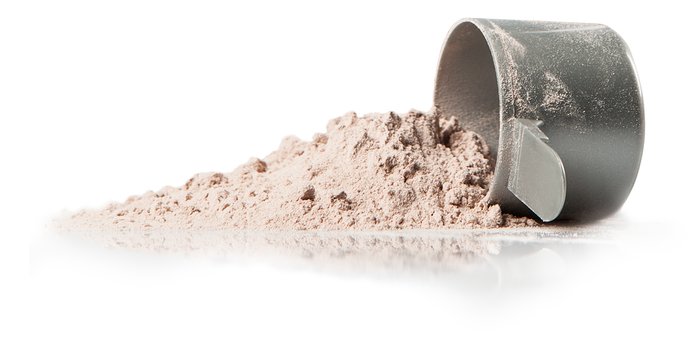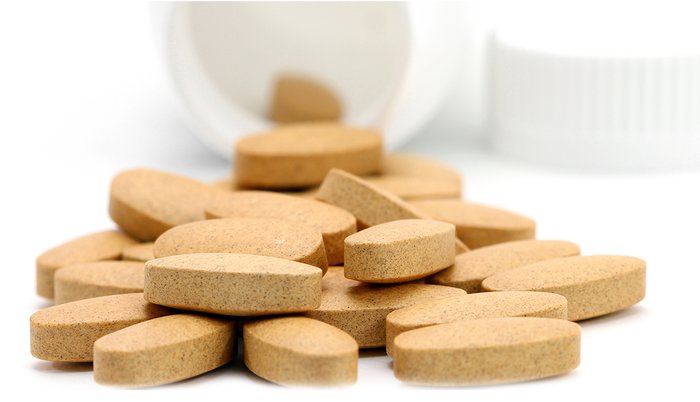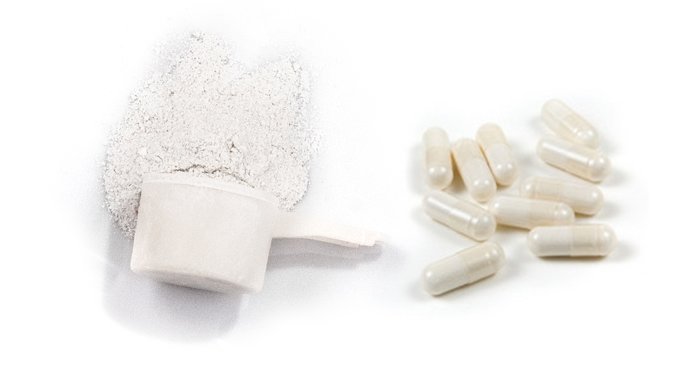For anyone new to the training game, even the basics of coming up with a training split, figuring out a nutrition plan, and calculating macros can be overwhelming. The last thing you need on top of all that is the pressure of figuring out which supplements to take!
Supplements won't replace a good nutrition plan or hard work in the gym, but they can help you achieve your fitness goals faster. Just take them at their name; they're called supplements, not replacements, for a reason.
Creatine Monohydrate
Chances are you've tried to lift a heavy weight or run a sprint at some point in your life. If you did, your body was relying on stored creatine (the primary energy substrate for short-duration, high-intensity work) to get the job done.
Perhaps more than any other supplement, creatine monohydrate has had extensive research done on its ability to safely and effectively increase high-intensity performance, muscle mass, and strength.[1] This research has shown that creatine supplementation increases stores of phosphocreatine (PCr), which is associated not just with measurable increases in performance, but with improved muscle recovery and training adaptations.[2]
Dosing methods
The slow approach: 3-5 grams of creatine monohydrate per day. Your muscle cells will reach full saturation after about a month.
The fast approach: 20 grams of creatine monohydrate per day for 5-7 days, then follow with a maintenance dose of 3-5 grams per day. This method is referred to as "loading creatine."
Whey Protein
Whether your goal is to pack on muscle mass, gain strength, or enhance your physique, protein is considered one of the foundational ingredients in any nutrition program. The Recommended Dietary Allowance (RDA) guidelines suggest a modest 0.8 grams of protein per kilogram of body weight (or about 0.4 grams per pound), but, according to research, that number is too low to support an active person.

If you do resistance training or a high level of physical activity on a regular basis, double-up on the RDA. Increasing your protein intake will not only help you put on muscle mass, but it can also help you recover faster from your workouts.
It is certainly possible to meet your protein needs through whole foods alone, but if you're struggling to finish all the food on your plate, a protein powder might be the answer. I recommend whey because of your body's ability to rapidly digest and use it.
Although total daily protein intake is important, protein quality and timing can be just as much a factor for people looking to capitalize on increasing muscle protein synthesis (MPS), which leads to muscle growth.
Leucine, a branched-chained amino acid found in sources such as whey protein, is responsible for initiating MPS. To optimize muscle growth and repair, you should aim to get about 3 grams of leucine every 3-4 hours. This translates to about 20-30 grams of protein.[3]
You can get that amount by selecting high-quality dietary protein from sources such as dairy, eggs, animal proteins, or fish. The role of whey protein or protein-blend supplements is to provide a convenient and effective way to make sure you get all the protein you need, especially following a workout.[4]
Dosing method
Consume 20-30 grams of whey protein or protein blend post-workout or in between meals for muscle growth and repair.
Multivitamin
Multivitamins may not be the sexiest supplements around, and chances are they won't add pounds to your squat PR or inches to your biceps, but a good multi is helpful for maintaining overall health.
Multivitamins are a convenient, cost-effective way to get nutrients you might not otherwise be getting from the foods you eat. Taking one a day can act as a kind of safety net to make sure you get the vitamins and minerals your body needs—especially if you have trouble including a wide variety of fruits and vegetables in your diet.

Multivitamin supplements are generally regarded as safe, although it is possible to consume too many vitamins and minerals within a short time frame. You can avoid that by choosing a multivitamin that contains the RDA of these nutrients.
Taking a multi to make sure you get all your nutrients make sense. Taking one just to increase your performance or muscle size… not so much.
Dosing method
In most cases, take a multivitamin once per day. To maximize absorbency, take it alongside a fatty food.
Caffeine
Ah, caffeine! What can't this miracle substance do? In addition to providing the usual increase in focus and concentration, it can also have a powerful effect on your weight-training performance. That's because caffeine helps increase brain activity, making you feel more energetic and helping to delay fatigue during exercise.

Although the data supporting caffeine's role in muscular strength is incomplete, a good caffeine supplement may be a game-changer for those days you need an extra kick before crushing the weights.[5]
Dosing method
If you're new to caffeine, take 100 milligrams of a caffeine supplement about 30-60 minutes before your workout. If you consume caffeine regularly, you'll likely have to increase that dosage to 250-300 milligrams to notice any energy-boosting effects.
It's possible to overdose on caffeine, but this is typically caused by caffeine-containing medications, not by beverages or foods. But to be on the safe side, limit your daily consumption of all forms of caffeine to 400 milligrams or less per day.
References
- Cooper, R., Naclerio, F., Allgrove, J., & Jimenez, A. (2012). Creatine supplementation with specific view to exercise/sports performance: an update. Journal of the International Society of Sports Nutrition, 9(1), 33.
- Baecle TR, Earle RW. Essentials Strength Training and Condition. Human Kinetics Publishers; 2009.
- Layman, D. K., Anthony, T. G., Rasmussen, B. B., Adams, S. H., Lynch, C. J., Brinkworth, G. D., & Davis, T. A. (2015). Defining meal requirements for protein to optimize metabolic roles of amino acids. The American Journal of Clinical Nutrition, 101(6), 1330S-1338S.
- Moore, D. R., Tang, J. E., Burd, N. A., Rerecich, T., Tarnopolsky, M. A., & Phillips, S. M. (2009). Differential stimulation of myofibrillar and sarcoplasmic protein synthesis with protein ingestion at rest and after resistance exercise. The Journal of Physiology, 587(4), 897-904.
- Hendrix, C. R., Housh, T. J., Mielke, M., Zuniga, J. M., Camic, C. L., Johnson, G. O., ... & Housh, D. J. (2010). Acute effects of a caffeine-containing supplement on bench press and leg extension strength and time to exhaustion during cycle ergometry. The Journal of Strength & Conditioning Research, 24(3), 859-865.

